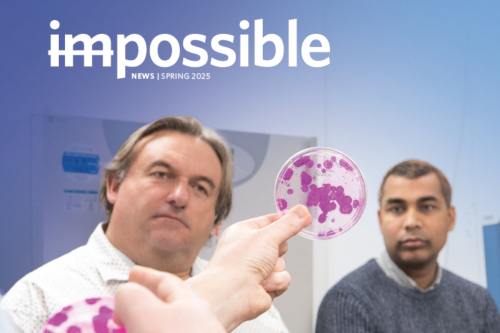Advancing discovery through biobanks

This week The Alfred Brain Tumour Bio-databank (ABTB) discovered a new hope in the treatment for brain cancer. The ABTB is one of three biobanks at The Alfred advancing research into new treatments.
Brain tumours such as glioblastoma (GBM) are the most common and aggressive form of brain cancer. Despite current treatment options the average survival for a GBM is only 14-15 months after diagnosis.
Dr Mastura Monif’s lab in our Neuroscience department is investigating a new drug to find a safe and effective treatment option for this type of brain cancer. Ms Liyen Katrina Kan, a PhD student in Dr Monif’s research group, has developed a new technique to test different drugs on GBM tissue.
Samples of brain tumours are taken and placed into a solution that breaks them down leaving only the cancerous GBM cells. This enables the team to add different drug treatments to the samples to test their effects on the tumour.
From using this technique, the team found a drug called AZ10606120, that substantially reduces the number of tumour cells by stopping a protein found in the GBM called P2X7R. The drug has the potential to halt tumour growth and has an anti-cancer effect that is more effective than conventional chemotherapy treatment.
For this research, the team use human GBM samples provided by the Alfred Brain Tumour Bio-databank (ABTB). The ABTB collect samples of tumours removed from patients who are undergoing surgery for brain cancer. The ABTB was established to work with our research teams in finding a more effective treatment options for those affected by the disease.
The Brain Tumour Bio-databank is one of three biobanks at The Alfred. Biobanks greatly enhance the impact potential of research by enabling discovery of bio-markers and disease-causing mechanisms that can rapidly lead to development of new treatments.
Through a substantial commitment from The James Foster Foundation in 2019, The Alfred’s Oncology Department was able to establish The Alfred Cancer Biobank.
Director of Oncology at The Alfred, Associate Professor Mark Shackleton believes cancer biobanks remain one of the most important weapons in the arsenal to find effective cancer therapies.
“Prior to this millennium, much research was conducted on lower organisms like worms and flies, and on cancer cells grown artificially in laboratories,” said A/Prof Shackleton. “While these systems were useful in many aspects – for example, the target genes of numerous anti-cancer drugs were first discovered in flies – they have limitations with respect to their applicability to human disease, which is typically very complex. Biobanks have changed this, allowing research to be conducted directly on human tissue and blood samples.”
The Alfred Cancer Biobank is enabling new and ground-breaking research, including a project targeting ways to sub-classify lung cancers for treatment without requiring tissue biopsies.
“Characterizing the molecular sub-type of lung cancer can be very difficult as tissue sampling requires a biopsy, which is invasive and can be risky. Through the biobank, we are hoping to identify ways to use blood sampling as an alternative” said Professor Shackleton.
“We are delighted to support The Alfred’s Cancer Biobank through the Trust set up under the Will of Iris Foster in memory of her husband, James Foster. Both James and his father Bryan were Honorary Surgeons at The Alfred and so the family has an almost 100 year association with the hospital.” - James Foster Foundation

Anna's story
59-year-old Anna is the type of patient our Biobank research aims to help. In 2014, a scan for suspected appendicitis unexpectedly revealed a mass, which when biopsied confirmed stage four lung cancer.
Anna’s particular sub-type of lung cancer meant she was eligible for an oral treatment which can shrink tumours quickly but eventually stops working for most people. For Anna to gain access to a second line treatment she needed to undergo another invasive biopsy. The research project aim is for lung cancers to be classified via a simple blood test, rather than the risky biopsies Anna endured.
“The Alfred has been so supportive, getting onto things early. Since my initial diagnosis there’s been a lot of progress into treatments and hopefully this continues,” said Anna.
“I once read that how you live your days is how you live your life and I’m so grateful I have been able to enjoy my life, and I have had a good life, thanks to accessing this kind of treatment.”
Find out about our current appeal

